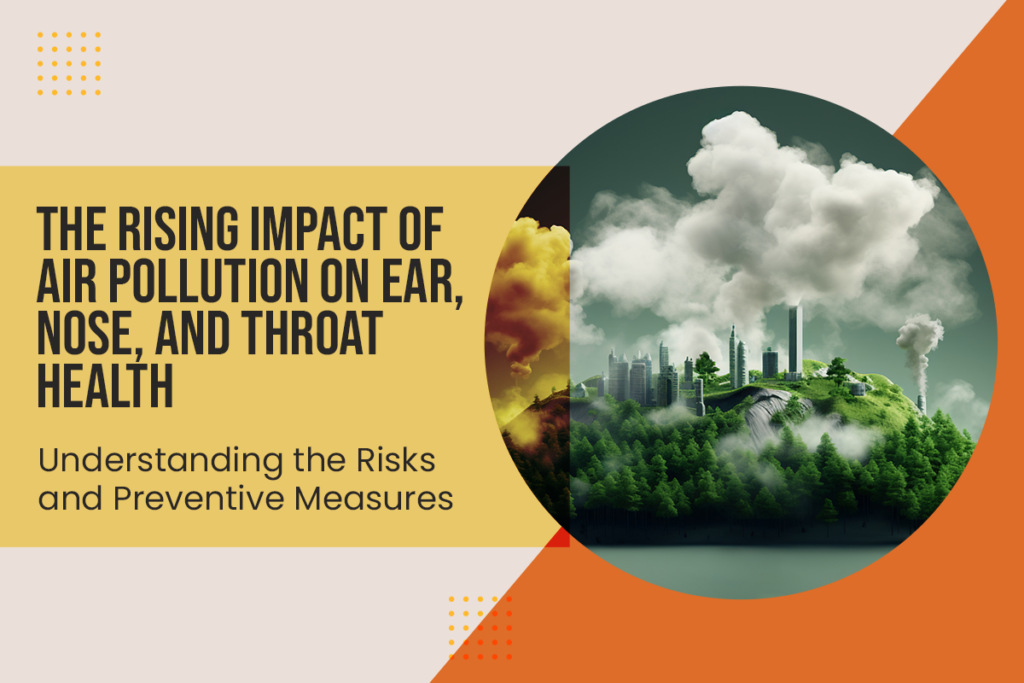1. Nasal and Sinus Problems:
Your nose and sinuses serve as the body’s first line of defense, filtering out harmful particles from the air. However, chronic exposure to air pollution can overwhelm this protective barrier. Congestion, sinus pressure, and frequent nosebleeds can result from this, as it can cause inflammation of the sinuses (sinusitis) and nasal passages (rhinitis). Pollution can also weaken your immune defenses, making you more vulnerable to infections.
2. Throat Irritation and Infection:
If you’re dealing with ear discomfort, such as wax buildup, itching, or infection, it’s essential to use products specifically designed for the ears. Ear drops, which are formulated to be gentle on the ear canal, can help relieve symptoms effectively. Although there are ear drops available over-the-counter for a variety of diseases, it is advisable to see an ENT professional to establish the best course of action.
3. Ear Infections and Hearing Loss:
In addition to harming your respiratory system, pollution can also create issues with your hearing. Fine particles in the air can make their way to the ear canal and inner ear, leading to inflammation or ear infections, particularly in children, whose immune systems are still developing. The eustachian tubes, which connect the middle ear to the throat, can also get obstructed by pollutants. Blocked tubes can cause fluid buildup, leading to ear infections and potentially temporary or even long-term hearing loss if left untreated.
Air Pollution and Respiratory Conditions
Additionally, respiratory diseases including asthma and chronic obstructive pulmonary disease (COPD) are made worse by air pollution. Pollutants can trigger flare-ups in individuals who are already managing these diseases, making symptoms like coughing, shortness of breath, and wheezing much worse. ENT specialists are often the first to recognize these complications, as they directly affect the respiratory and airway systems.
Who is Most Vulnerable to the Effects of Air Pollution?
Certain populations are particularly susceptible to the negative effects of air pollution on ENT health. These include:
- Children: With smaller airways and developing immune systems, children are more likely to develop respiratory infections, ear problems, and other ENT issues due to pollution.
- Older Adults: As people age, their immune systems naturally weaken, leaving them more vulnerable to chronic sinus infections, hearing loss, and throat problems.
- Those with Pre-existing Conditions: Individuals with asthma, allergies, COPD, or a history of ear infections face a higher risk of suffering from pollution-related ENT health issues.
- Urban Residents: People living in cities with high levels of air pollution are at a greater risk of developing ENT and respiratory conditions compared to those in rural areas.
How to Protect Your ENT Health from Air Pollution
Although it’s impossible to completely avoid air pollution, there are several strategies you can use to reduce its impact on your ENT health:
1. Use an Air Purifier
Purchasing an air purifier with a HEPA filter might assist in eliminating small particles from your home’s air. This is especially important in bedrooms and living areas where you spend the most time.
2. Avoid Outdoor Activities During High Pollution Days
Keep abreast of local air quality reports and avoid going outside during periods of excessive pollution. If you must go outside, avoid intense physical exertion, which can cause you to inhale more polluted air.
3. Wear a Mask
If you live in a polluted area or need to go outdoors during high pollution levels, wearing a mask can help filter harmful particles from entering your respiratory system.
4. Stay Hydrated
By keeping the mucosal membranes in your throat and nose moist, drinking adequate water lessens the effects of pollutants and dry air. Drinking enough water also helps your body rid itself of pollutants.
5. Regular ENT Check-ups
Seeing an ENT professional on a regular basis is crucial for people who live in polluted areas or frequently have ENT problems. Conditions can be kept from deteriorating or becoming chronic by early diagnosis and treatment.
6. Practice Breathing Exercises
Breathing techniques like diaphragmatic or deep breathing can improve lung capacity by strengthening the respiratory system and cleaning the airways of impurities.

